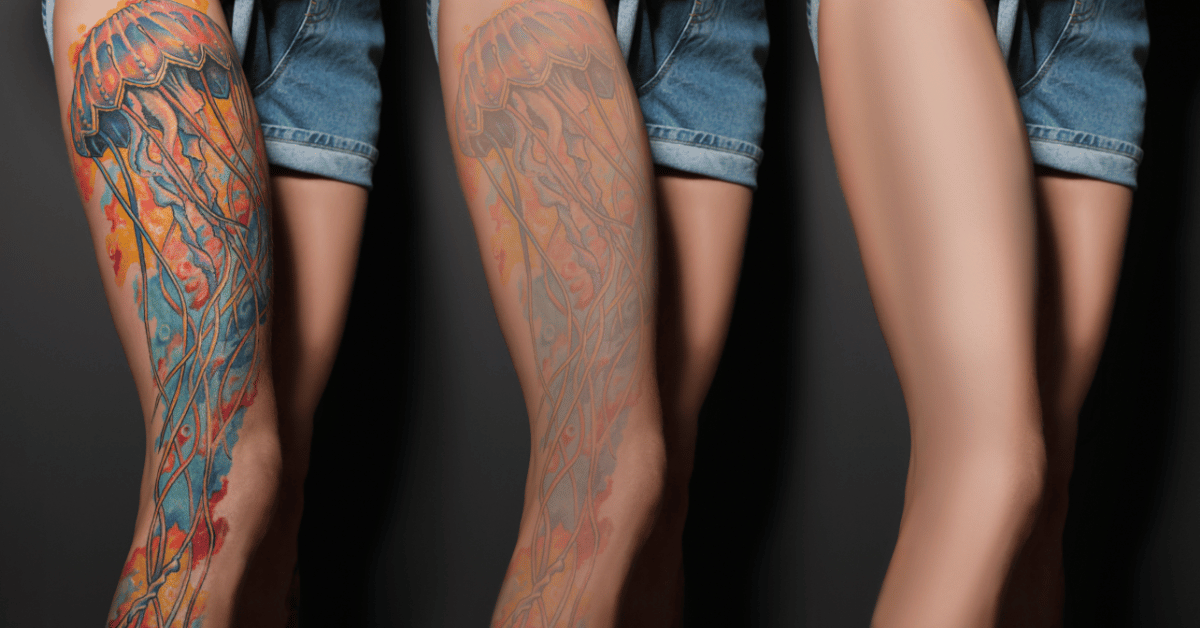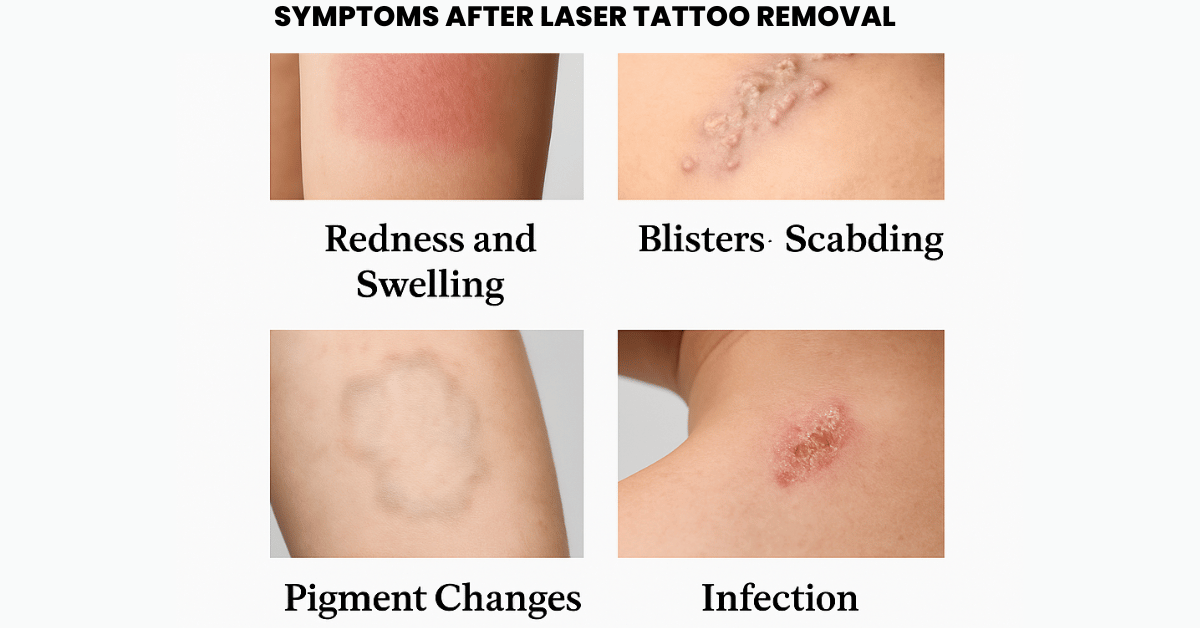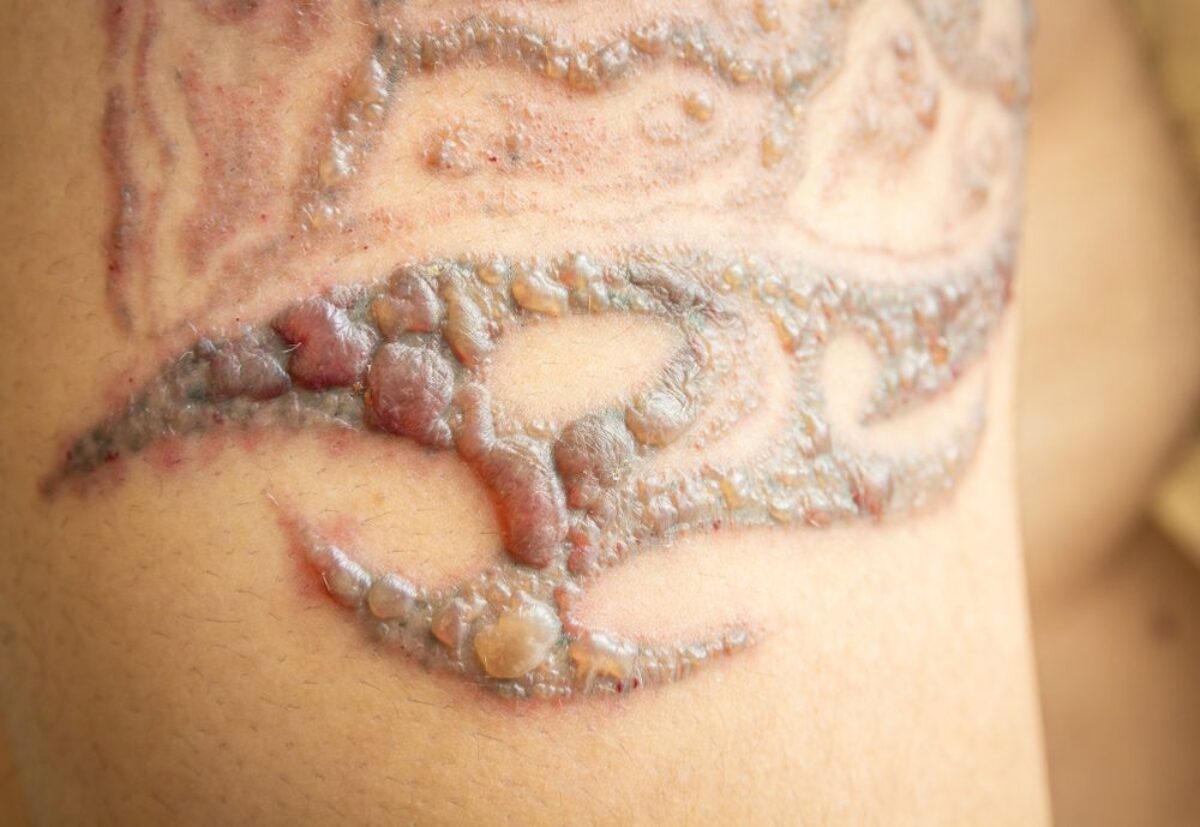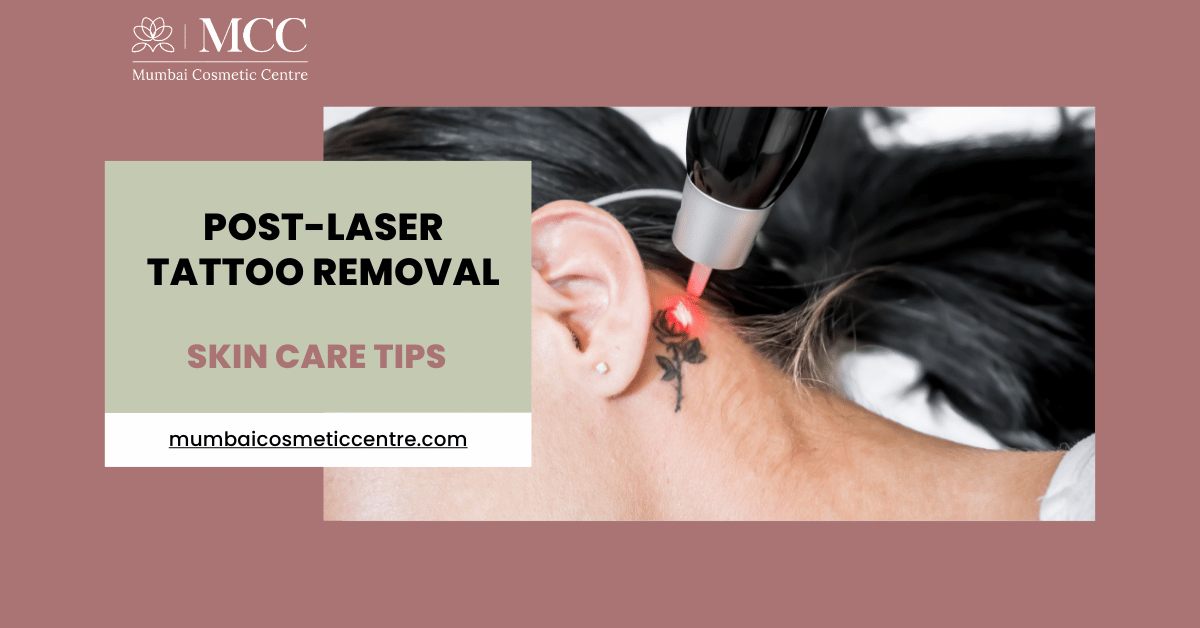Laser tattoo removal is a highly effective method for erasing unwanted tattoos, offering individuals the opportunity to remove ink that no longer aligns with their preferences or lifestyle. However, the aftercare following this procedure is just as crucial as the treatment itself. Proper skin care after laser tattoo removal not only ensures optimal healing but also prevents complications such as scarring, infection, or pigment changes. In this blog, we’ll explore the essential skin care tips you need to follow post-laser tattoo removal, including common concerns, effective treatments, and expert advice.
Understanding Laser Tattoo Removal

Laser tattoo removal is a medical procedure that uses high-intensity light to break down the ink particles in your skin. The laser targets the tattoo’s pigment, breaking it up into smaller particles that are then absorbed and flushed out by the body. This method is highly precise and minimally invasive, with little to no damage to the surrounding skin.
- How it works: The laser emits light that penetrates the skin and breaks the tattoo ink into smaller pieces. Over time, the body naturally eliminates these ink particles through the lymphatic system. Depending on the color and depth of the tattoo, multiple sessions may be required.
- Safety: Laser tattoo removal is generally safe when performed by a trained professional. The procedure is well-regulated, and risks like scarring or discoloration are minimal if proper aftercare is followed.
Common Concerns and Symptoms After Laser Tattoo Removal
While laser tattoo removal is a non-invasive procedure, it’s not without its risks and potential complications. After undergoing the treatment, you may experience some mild side effects as your skin begins the healing process. Understanding these common concerns can help you manage your expectations and ensure a smoother recovery.

- Redness and Swelling: It’s common to experience some redness or swelling around the treated area immediately after the procedure. This is a normal response to the laser treatment and should subside within a few hours to a few days.
- Blisters and Scabbing: Blisters may form as part of the skin’s healing process. It’s important not to pop these blisters as this could lead to infection or scarring. Similarly, scabs might appear, but they should be left to fall off naturally.
- Pigment Changes: In rare cases, people may experience temporary or permanent changes in skin pigmentation, such as lightening or darkening of the skin in the treated area. While these changes usually resolve over time, some individuals may require additional treatments to address this concern.
- Infection: If proper aftercare is not followed, there is a risk of infection. It’s essential to keep the treated area clean and avoid picking at scabs or blisters.
Post-Treatment Care and Best Practices
Post-treatment care is critical in ensuring the success of the laser tattoo removal process. By following a few essential skin care tips, you can promote healing, reduce discomfort, and avoid complications. Here are the best practices you should follow after your laser tattoo removal treatment:
- Keep the Area Clean and Dry: Gently wash the treated area with mild soap and lukewarm water. Avoid scrubbing the area to prevent irritation or damage to the skin. After cleaning, gently pat the area dry with a clean towel.
- Moisturize: Apply a recommended ointment or healing gel to keep the skin hydrated and prevent scabbing. Aloe vera gel or specialized tattoo aftercare creams are ideal for this purpose.
- Avoid Sun Exposure: The skin is particularly sensitive after laser treatment, and exposure to the sun can cause hyperpigmentation, scarring, or sunburn. It’s essential to avoid direct sunlight on the treated area for at least 4 to 6 weeks after the procedure. If you need to go outside, wear a broad-spectrum sunscreen with SPF 30 or higher to protect your skin.
- Don’t Pick or Scratch: As the skin heals, scabs or blisters may form. It’s tempting to pick at them, but doing so can result in scarring or infection. Allow the skin to heal naturally.
- Avoid Swimming: Swimming pools, hot tubs, and natural bodies of water can harbor bacteria, which may cause infection. It’s best to avoid these until your skin has fully healed.
- Wear Loose Clothing: Tight clothing can rub against the treated area and cause irritation. Wearing loose-fitting clothes allows the skin to breathe and heal without additional friction.
How Long Does My Skin Take to Heal?
After laser tattoo removal, the healing process generally takes a few weeks, though full recovery may take several months. The exact timeline varies depending on factors such as the size and depth of the tattoo, your skin type, and how well you care for the treated area. Here’s what to expect during the healing process:

- Initial Healing (1-2 weeks): During the first week, you may experience redness, swelling, and blistering. These symptoms usually subside within a few days. By the second week, the treated area may start to scab, which is a sign of healing.
- Mid-Healing (2-6 weeks): As the scabs fall off, the skin may appear slightly pink or discolored. This is normal and should fade over time. You’ll want to continue moisturizing and avoiding sun exposure to protect the healing skin.
- Final Healing (3-6 months): While the skin might appear healed in a few weeks, the ink particles are still being eliminated by the body, so it can take several months for the tattoo to fade completely. During this time, you may notice gradual fading of the tattoo as the body works to remove the ink.
Essential Skin Care Tips for Optimal Results
To ensure optimal results after laser tattoo removal, it’s important to adhere to a few extra skin care tips that can help speed up healing and improve the final outcome:
- Stay Hydrated: Proper hydration is crucial for skin health. Drinking enough water helps maintain elasticity and can accelerate the healing process.
- Healthy Diet: Eating a balanced diet rich in vitamins A and C can support the skin’s healing process. Foods like citrus fruits, berries, and leafy greens can boost collagen production and skin repair.
- Use Recommended Aftercare Products: Always use the ointments and creams recommended by your specialist. These products are formulated to support healing and minimize the risk of infection or scarring.
- Avoid Hot Showers or Baths: Hot water can irritate the treated skin and slow down the healing process. Use lukewarm water for showers, and avoid soaking in hot tubs or swimming pools.
- Monitor for Complications: Keep an eye out for any signs of infection, such as excessive redness, pus, or increased pain. If you notice any unusual symptoms, contact your practitioner immediately.
Expert Recommendations for Optimal Results
Although following basic skin care practices will help with healing, there are some expert recommendations to enhance your results and ensure a speedy recovery:
- Follow-Up Sessions: Laser tattoo removal often requires multiple sessions. It’s important to attend all scheduled appointments and follow your professional’s guidance to achieve the best results. Skipping sessions or delaying them can impact the effectiveness of the treatment.
- Hydration and Nutrition: Keeping your body well-hydrated and eating a balanced diet can aid in the healing process. Drinking plenty of water helps keep your skin healthy, while foods rich in vitamins A and C can support skin repair.
- Consult Your Practitioner: If you experience any unusual symptoms, such as excessive swelling, pain, or signs of infection, contact your laser removal specialist immediately. Early intervention can prevent complications and help you recover faster.
Consultation for Tattoo Removal at Mumbai Cosmetic Centre
If you are considering tattoo removal or are in the process of post-treatment care, it’s crucial to consult a professional to ensure optimal results and a smooth recovery. Mumbai Cosmetic Centre, located in Malad, Mumbai, provides transformative beauty treatments, including advanced tattoo removal procedures.
Under the expertise of Dr. Shruti Shah, a pioneer in her field, and Dr. Chetan Shah, a highly respected board-certified anesthesiologist, the clinic offers a comprehensive range of services, from non-surgical treatments like HIFU to cosmetic gynecological procedures. The team at Mumbai Cosmetic Centre incorporates the latest technologies to deliver the best outcomes for their patients.
For consultations and appointments, visit Mumbai Cosmetic Centre at:
Mumbai Cosmetic Centre
1st Floor, Milap Apt, Swami Vivekananda Rd,
Opp. Milap PVR Cinemas, Malad West, Mumbai,
Maharashtra 400064
Phone: +91-7400188399
Email: mccmumbaicosmeticcentre@gmail.com
FAQs on Post-Laser Tattoo Removal
- How long does it take for skin to heal after laser tattoo removal? Healing time can vary, but it generally takes about 2 to 3 weeks for the skin to heal fully. However, it may take several months for the tattoo to fade completely.
- Is laser tattoo removal painful? While the procedure itself may cause some discomfort, most people describe it as a feeling of snapping rubber bands against the skin. Topical numbing creams are applied to minimize pain during the session.
- How many sessions are required for complete tattoo removal? Most tattoos require 5 to 10 sessions, spaced 6 to 8 weeks apart. The number of sessions depends on factors like the size, color, and depth of the tattoo.
- Can I remove colored tattoos with laser? Yes, colored tattoos can be removed using specific lasers designed for different ink pigments. Laser technology has advanced to target various colors effectively.
- Can I shower after laser tattoo removal? Yes, you can shower, but avoid hot water and scrubbing the treated area. Gently pat the skin dry afterward.
- Can I resume normal activities after tattoo removal? You can resume most normal activities, but avoid strenuous exercises and activities that cause excessive sweating for the first few days.
Conclusion
Post-laser tattoo removal care is essential to ensure a successful outcome and reduce the risk of complications. By following the right aftercare guidelines, you can promote faster healing, minimize discomfort, and achieve the best results. Remember, always seek advice from qualified professionals to guide you through the process. If you’re considering tattoo removal, consult with experts at Mumbai Cosmetic Centre for personalized care and optimal results.
